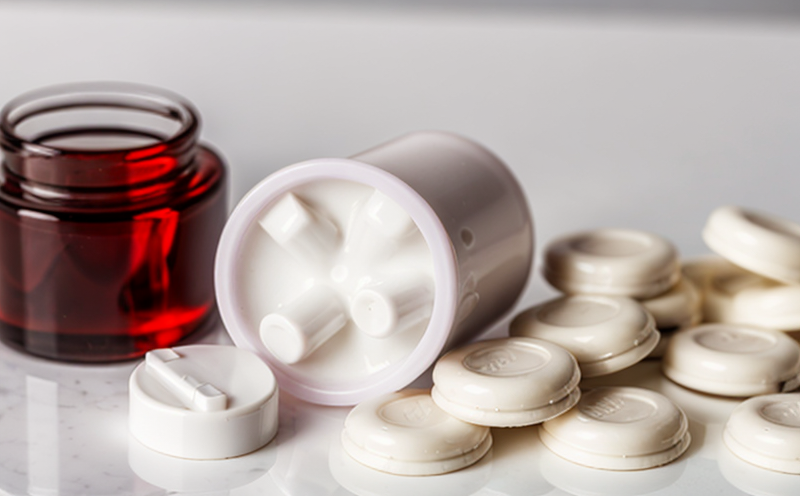USP Capsule Stability Under Humidity Testing
The USP (United States Pharmacopeia) capsule stability under humidity testing is a critical procedure that ensures the integrity and efficacy of pharmaceutical products. This test evaluates how well drug formulations maintain their physical, chemical, and biological properties when exposed to varying levels of humidity in different storage conditions.
USP guidelines are among the most stringent standards in the industry for ensuring drug quality. Capsules, being a common oral solid dosage form, must undergo rigorous stability testing to guarantee that they remain effective over their shelf life. This test is particularly important as it helps pharmaceutical manufacturers understand how humidity can impact capsule performance and ultimately patient safety.
During this test, capsules are exposed to controlled humidity levels for extended periods. The aim is to simulate real-world storage conditions where the product may be stored in various environments, from dry and cool warehouses to warmer, more humid regions. By subjecting the capsules to these conditions, manufacturers can identify any potential changes that could affect the drug's potency, stability, or safety.
The testing process typically involves placing the capsules in a controlled humidity chamber, where they are exposed to specific humidity levels for defined durations. The temperature is also carefully controlled to simulate different climate zones around the globe. After exposure, the capsules are analyzed using various analytical methods such as high-performance liquid chromatography (HPLC), differential scanning calorimetry (DSC), and Fourier transform infrared spectroscopy (FTIR) to assess changes in their chemical composition and physical properties.
The USP guidelines specify acceptance criteria for these tests. For instance, the capsule's weight loss or gain must not exceed a certain threshold, and there should be no significant color change or degradation of the active pharmaceutical ingredient (API). If any deviations are observed, further investigation is required to determine their root cause.
Understanding the impact of humidity on capsules is crucial for optimizing storage conditions and shelf life. This knowledge helps in developing robust quality assurance protocols that can prevent issues during product distribution and storage. Pharmaceutical companies rely on accurate and reproducible testing methods to ensure compliance with regulatory requirements and maintain patient trust.
Industry Applications
The USP capsule stability under humidity testing is widely applicable across the pharmaceutical industry, particularly in sectors dealing with oral solid dosage forms. This test ensures that products meet stringent quality standards set by regulatory bodies such as the FDA and EMA. Compliance with these guidelines not only enhances product safety but also facilitates smoother market entry and distribution.
Quality managers and compliance officers frequently use this testing method to monitor the stability of new formulations or reformulated products. By conducting periodic stability studies, they can identify potential issues early in the development process, allowing for timely adjustments that prevent costly recalls later on.
R&D engineers benefit from this test by gaining insights into how different environmental factors influence capsule performance. This information is invaluable when designing and optimizing new drug delivery systems or improving existing formulations. For procurement teams, ensuring suppliers meet these stringent standards guarantees the reliability of raw materials used in capsule production.
Eurolab Advantages
EuroLab offers unparalleled expertise and advanced facilities for conducting USP capsule stability under humidity testing. Our state-of-the-art laboratories are equipped with sophisticated instruments capable of accurately simulating a wide range of environmental conditions, ensuring precise and reliable results.
Our team of highly qualified scientists and technicians brings deep industry knowledge to every project, providing clients with comprehensive insights into their product's stability profile. We pride ourselves on delivering timely reports that are not only accurate but also easy to understand, facilitating swift decision-making processes within organizations.
EuroLab adheres strictly to international standards such as USP and ICH guidelines, ensuring that all test results meet the highest industry expectations. Our commitment to quality control is reflected in our ISO 17025 accreditation, which guarantees impartiality and traceability throughout the testing process.
Competitive Advantage and Market Impact
EuroLab's proficiency in USP capsule stability under humidity testing provides a significant competitive edge for pharmaceutical companies. By offering reliable, reproducible test results, we enable clients to make informed decisions regarding their products' shelf life and storage requirements.
This capability supports organizations in maintaining compliance with regulatory standards while also enhancing brand reputation through consistent product quality. In an increasingly competitive market, such advantages can translate into increased customer satisfaction and loyalty, potentially boosting sales and market share.
Moreover, our expertise in this area helps pharmaceutical companies navigate complex regulations more effectively, reducing the risk of non-compliance penalties or withdrawals from the market. This proactive approach not only protects current operations but also facilitates future growth opportunities by ensuring products are well-prepared for launch into new markets.





